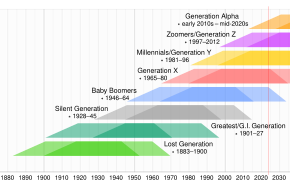
Back Millenniër-leerders Afrikaans جيل الألفية Arabic Xeneración Y AST Y nəsli Azerbaijani Milenyal BCL Пакаленьне Y BE-X-OLD Поколение Y Bulgarian Generació Y Catalan Generace Y Czech Generation Y Danish
| Part of a series on |
| Social generations of the Western world |
|---|
 |
Millennials, also known as Generation Y or Gen Y, are the demographic cohort following Generation X and preceding Generation Z. Researchers and popular media use the early 1980s as starting birth years and the mid-1990s to early 2000s as ending birth years, with the generation typically being defined as people born from 1981 to 1996.[1][2] Most millennials are the children of Baby Boomers and older Generation X.[3] In turn, millennials are often the parents of Generation Alpha.[4]
As the first generation to grow up with the Internet, millennials have been described as the first global generation.[5] The generation is generally marked by elevated usage of and familiarity with the Internet, mobile devices, social media, and technology in general.[6] The term "digital natives", which is now also applied to successive generations, was originally coined to describe this generation.[7] Between the 1990s and 2010s, people from developing countries became increasingly well-educated, a factor that boosted economic growth in these countries.[8] In contrast, millennials across the world have suffered significant economic disruption since starting their working lives, with many facing high levels of youth unemployment in the wake of the Great Recession and the COVID-19 recession.[9][10]
Millennials, in the US, have been called the "Unluckiest Generation" as the average millennial has experienced slower economic growth and more recessions since entering the workforce than any other generation in history.[11] They have also been weighed down by student debt and childcare costs.[12] Across the globe, millennials and subsequent generations have postponed marriage or living together as a couple.[13] Millennials were born at a time of declining fertility rates around the world,[14] and continue to have fewer children than their predecessors.[15][16][17][18] Those in developing countries will continue to constitute the bulk of global population growth.[19] In developed countries, young people of the 2010s were less inclined to have sex compared to their predecessors when they were the same age.[20] Millennials in the West are less likely to be religious than their predecessors, but may identify as spiritual.[14][21]
- ^ "Sorry, boomers: millennials and younger are new US majority". AP News. 3 August 2020.
- ^ Kaur, Brahmjot (26 September 2023). "Different generations are sharing what they did before they could look stuff up on the internet". NBC News.
- ^ Strauss, William; Howe, Neil (2000). Millennials Rising: The Next Great Generation. Cartoons by R.J. Matson. New York: Vintage Original. p. 54. ISBN 9780375707193.
- ^ Carter, Christine Michel. "The Complete Guide To Generation Alpha, The Children Of Millennials". Forbes. Archived from the original on 9 April 2022. Retrieved 26 December 2021.
- ^ David Pendleton, Peter Derbyshire, Chloe Hodgkinson (2021), Work-Life Matters: Crafting a New Balance at Work and at Home (p. 35), Springer Nature, ISBN 9783030777685
- ^ "NowUKnow: Millennials Lead the Way in the Digital Future". www.bentley.edu. 19 October 2018.
- ^ Cite error: The named reference
Prenskywas invoked but never defined (see the help page). - ^ Cite error: The named reference
Soloman-2018was invoked but never defined (see the help page). - ^ Kahn, Michael (9 July 2020). "Coronavirus 'Class of 2020': Europe's lost generation?". World News. Reuters. Retrieved 18 July 2020.
- ^ Kurtzleben, Danielle (8 June 2020). "Here We Go Again: Millennials Are Staring At Yet Another Recession". NPR. Retrieved 3 July 2020.
- ^ Dam, Andrew Van (5 June 2020). "Analysis | The unluckiest generation in U.S. history". Washington Post. ISSN 0190-8286. Retrieved 23 August 2023.
- ^ Mark, Julian (12 August 2023). "'Unluckiest generation' falters in boomer-dominated market for homes". Washington Post. Retrieved 23 August 2023.
- ^ Cite error: The named reference
Gan-2021was invoked but never defined (see the help page). - ^ a b Cite error: The named reference
Kaufmann-2013was invoked but never defined (see the help page). - ^ Cite error: The named reference
TheEconomist-2019was invoked but never defined (see the help page). - ^ Cite error: The named reference
van de Waterwas invoked but never defined (see the help page). - ^ Cite error: The named reference
Bodinwas invoked but never defined (see the help page). - ^ Zeihan, Peter (2016). The Absent Superpower: The Shale Revolution and a World without America. Zeihan on Geopolitics. ISBN 9780998505206.
- ^ Cite error: The named reference
AFP-2018was invoked but never defined (see the help page). - ^ Cite error: The named reference
Julian-2018was invoked but never defined (see the help page). - ^ Cite error: The named reference
Goldberg-2020was invoked but never defined (see the help page).